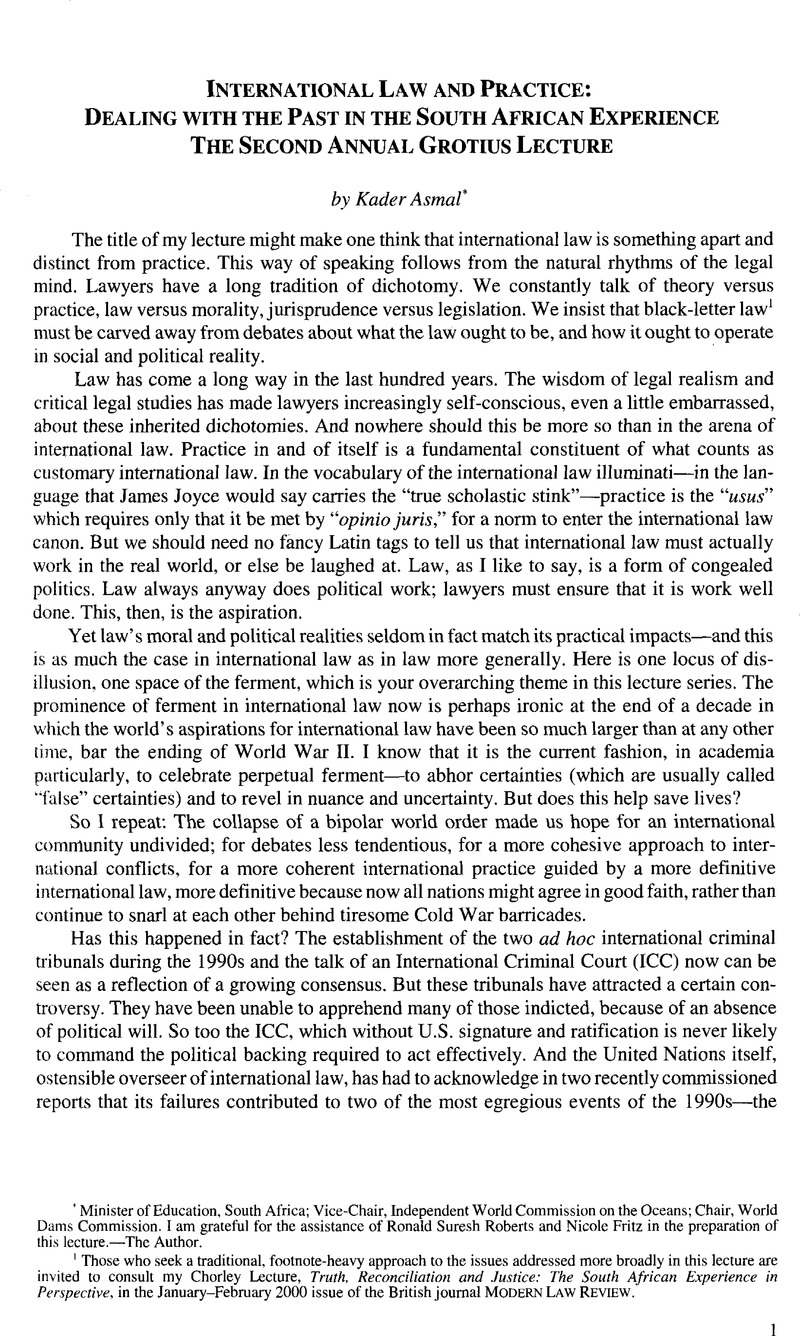Article contents
International Law and Practice: Dealing with the Past in the South African Experience the Second Annual Grotius Lecture
Published online by Cambridge University Press: 28 February 2017
Abstract

- Type
- Meeting Report
- Information
- Copyright
- Copyright © American Society of International Law 2000
References
1 Those who seek a traditional, footnote-heavy approach to the issues addressed more broadly in this lecture are invited to consult my Chorley Lecture, Truth, Reconciliation and Justice: The South African Experience in Perspective, in the January-February 2000 issue of the British journal Modern Law Review.
2 For a thoughtful review of enforcement issues, see Koh, Harold Hongju, How Is International Law Enforced?, 74 Ind. L. J. 1397 (1999)Google Scholar.
3 International Council on Human Rights, Ends and Means: Human Rights Approaches to Armed Groups—Draft Report For Consultation (1999).
4 Promotion of National Unity and Reconciliation Act 34 of 1995 [hereinafter Act].
5 Act, section 3.
6 Hayner, Priscilla B., International Guidelines for the Creation and Operation of Truth Commissions: A Preliminary Proposal, 59 Law & Contemp. Probs. 173 (1996)CrossRefGoogle Scholar.
7 Act § 11.
8 Act ch. 5.
9 Act § 20 (l) (c).
10 Act § 20.
11 Roberts, A., NATO’s “Humanitarian War” over Kosovo, 41 Survival 102 (1999)CrossRefGoogle Scholar.
12 Id., at 103.
13 Kader Asmal Et Al. , Reconciliation Through Truth: A Reckoning of Apartheid’s Criminal Justice 176(1997).
14 Id. at 177-78.
15 See the exchange between Robert Skidelsky and Michael Ignatieff, Is Military Intervention over Kosovo Justified?, Prospect, May 3, 1999.
16 There, prosecution before the ICC will also depend on a host of other factors—e.g, that the country of which the accused is a national has not prosecuted or has decided not to prosecute.
17 Unless the ICC adopts the reasoning of a recent Chilean High Court, holding that “disappearances” for which no information exists constitute continuing crimes.
18 P. Kahn, The End of the Post-War Compromise? 8 (unpublished manuscript, on file with author).
19 Andrew Parker, Cook Calls for UN Rules to Allow State Intervention, Financial Times, Jan. 29, 2000 at 3.
20 John R. Bolton, The Global Prosecutors, Foreign Aff., Jan./Feb. 1999 at 157-158.
21 Noam Chomsky has written of the outburst against Serbs “of virulent race-hatred and jingoism, a phenomenon I have not seen in my lifetime since the hysteria whipped up about ‘the Japs’ during World War II.”
22 Noam Chomsky, The New Military Humanism: Lessons from Kosovo (1999).
23 Report of the Independent Inquiry into the Actions of the United Nations During the 1994 Genocide in Rwanda, Dec. 15, 1999. <http://www.Un.org/News/ossg/rwanda_report.htm>.
24 Steve Coll, The Other War, Wash. Post, Jan. 9, 2000 at W8.
25 2 Trial of the Major War Criminal before the International Military Tribunal, Nuremberg, 154 (1947).
26 M. Cherif Bassiouni, 1 International Criminal Law (2nd ed., 1999).
27 Meron, Theodor, Common Rights of Mankind in Gentilli, Grotius and Suárez, in War Crimes Law Comes of Age 124 (1998)Google Scholar.
28 Article 17(l)(b) provides that the ICC shall determine that a case is inadmissible where “the case has been investigated by a State which has jurisdiction over it and the State has decided not to prosecute the person concerned, unless the decision resulted from the unwillingness or inability of the State genuinely to prosecute.” Rome Statute of the International Criminal Court,Art. 17(1)(6), July 17, 1998, UN Doc. A/CONF.183/9, obtainable from <http://www.un.org/Depts/Treaty/collection/notpubl/rome-en-c.htm.
29 Act, supra n. 4.
30 Azanian Peoples Organization (AZAPO) v. President of the RSA, 1996 (8) BCLR 1015 (CC); see also Azanian Peoples Organization (AZAPO) v. Truth and Reconciliation Commission, 1996 (4) SA 562.
31 Ruti Teitel, Transitional Justice 6 (1999).
32 See Asmal; Asmal and Roberts, Reconciliation Through Truth.
33 International Council on Human Rights, Hard Cases: Bringing Human Rights Violators to Justice Abroad (1999).
34 Orentlicher, Diane F., Settling Accounts: The Duty to Prosecute Human Rights Violations of a Prior Regime, 100 Yale L. J. 2548-549 (1991)CrossRefGoogle Scholar. This position is also advocated by Bassiouni, M. Cherif, who scathingly criticizes any process that would allow political considerations to prevent full-scale prosecutions: Introduction, 59 Law & Contemp. Probs. 5 (1996)Google Scholar. (The practice of impunity has all too frequently been the result of realpolitik. At times it is rationalized as a necessary evil, which is indispensable to achieving peace. While this is true in some cases, in most cases it is a cynical manipulation by governments of people’s expectations that both peace and justice can be attained).
35 The best recent article on the absoluteness or otherwise of the duty to prosecute is Scharf, Michael, The Letter of the Law: The Scope of the International Legal Obligation to Prosecute Human Rights Crimes, 59 Law & Contemp. Probs. 41 (1996)CrossRefGoogle Scholar.
36 Ignatieff, supra note 15, n.3.
- 1
- Cited by


